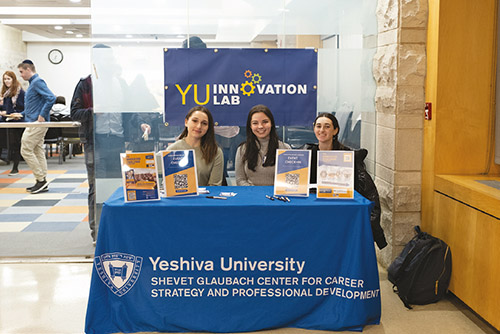
(Courtesy of YU) Career services in higher education has had many faces over the years resulting from the needs of the institution and greater society, shifts in the economy and emerging trends in the job market. The first face was that of a vocation bureau in the early 20th century whose sole purpose was to assist those newly arriving in our country with finding work. The next face was the shift to vocational guidance in the 1920s and 1930s, an emergence from the need to educate more teachers. The period from the 1940s through the 1960s saw the need to have “placement centers” on college campuses as GI Bill veterans were seeking employment.
Psychologist Albert Bandura introduced the concept of self-efficacy in the 1970s—a person’s perception of their ability to reach a goal on their own —and in the 1980s, John Holland’s work emerged, founded in the idea that when choosing a career, people prefer to be in roles and at companies where people are like them. The Meyers-Briggs Type Inventory (MBTI) became wildly popular as it assessed personality type and a new “right fit” criteria was born as companies strived to build like-minded cultures. Career planning and counseling centers came out the last two decades, focusing on helping students plan their own job search. The 1990s and 2000s saw these centers being transformed into offices for networking, using connections to land at the job of one’s choice.
Our face now is a technological one as the field transitions from placement and counseling to include design, coaching and strategy. The work roles of tomorrow are ever changing as we adapt and evolve towards future recruiting and hiring processes. Artificial intelligence powers the candidate selection process, taking over a responsibility formerly held by humans. Platforms exist which can score a student’s resume when comparing it to the description of the job being applied to—the higher the percentage match, the more likely it is that one will be asked to interview. Conversations previously conducted by HR professionals are now taking place on computer screens where our students are asked to speak to the proverbial black hole being populated by applicant tracking systems (ATS) who are identifying candidates electronically.
The YU Career Center has evolved to meet the industry demands being put on its students. The gift from the Glaubach Family has enabled a transformational change in the services and what will be offered to the YU students to prepare them, as well as the staff, to tackle this ever-changing world. As mentioned, the ATS systems now in use by employers require candidates to match up point-by-point to the job description to attain a score high enough to warrant an interview. The new Shevet Glaubach Center for Career Strategy and Professional Development (SGC) has adopted technology to obtain the high percentage match and to beat the ATS. Students now have access to an electronic checklist for each career path and year in school to track the completion of their career strategy. LinkedIn enables career advisers to reach out to potential recruiting contacts and alumni at hiring companies, yet a new technology being implemented in the SGC. YU career advisers will source work emails to reach out directly to those in hiring positions to advocate for YU students as they progress through the application and offer process.
Yeshiva University students are adept at building connections and partnerships for success and having a network and career community of their own. Can students source jobs and land placements alone? Yes—YU students are dynamic individuals who are empowered to make career decisions, connect their own dots and find their own opportunities. However, at YU we strive to magnify our students’ efforts and work collaboratively with them to make the placement connections for them and send them into the world with the necessary tools to always be able to succeed.
Our students work many hours and have many responsibilities in their lives, and they are at university to reach a goal, whether it be a job, graduate school acceptance or another endeavor. When the SGC staff, YU faculty and alumni focus their extensive resources on assisting students at each step in the placement process, YU students will have the extra support they need to build a successful career, allowing them to thrive on the personal level, contribute the the community and have a positive impact on our world.









